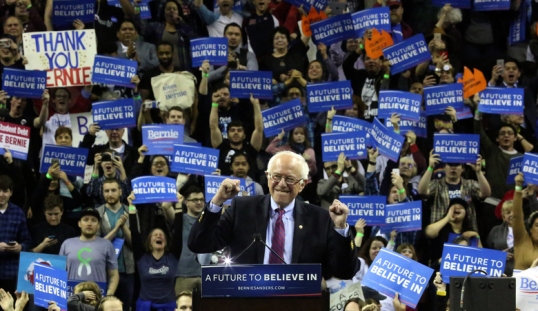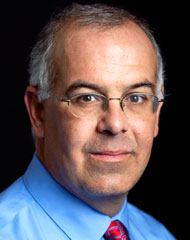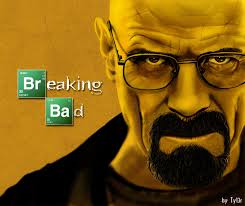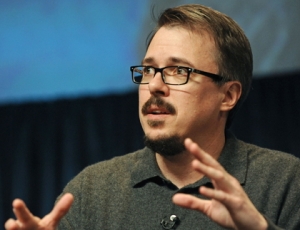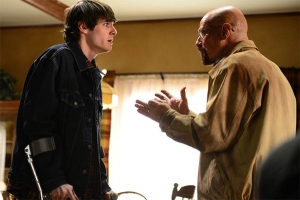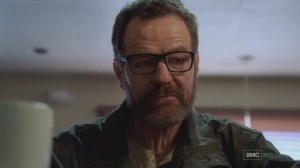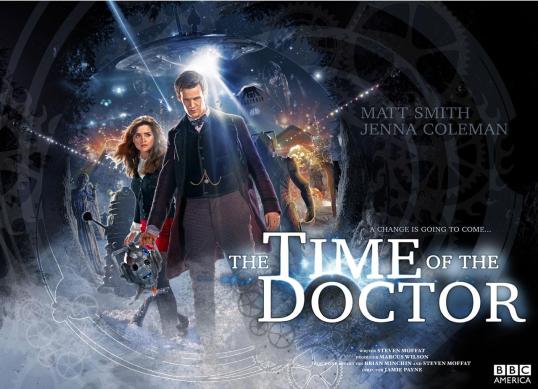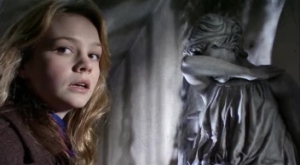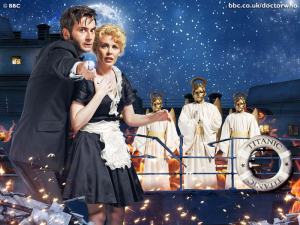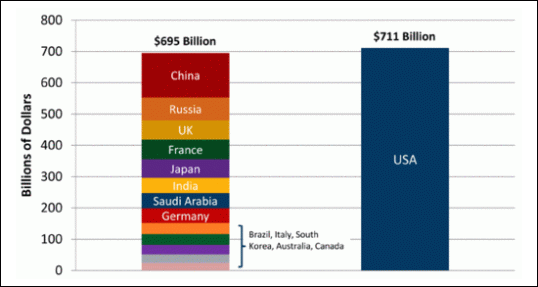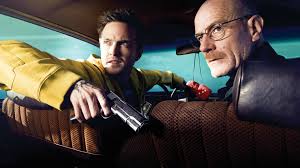 Time is relative, especially when it comes to pop culture, and most especially when it comes to fiction. Even the most timeless classic bears the unmistakable imprint of its age. Sure, Robert Altman’s M*A*S*H* is set in Korea, but it’s really about Vietnam. You don’t need to be a student of film or history to know Baz Luhrman’s The Great Gatsby wasn’t made during the decade in which it’s set. Even William Shakespeare’s Julius Caesar tells us far more about Elizabethan succession anxiety than the fall of the Roman Republic.
Time is relative, especially when it comes to pop culture, and most especially when it comes to fiction. Even the most timeless classic bears the unmistakable imprint of its age. Sure, Robert Altman’s M*A*S*H* is set in Korea, but it’s really about Vietnam. You don’t need to be a student of film or history to know Baz Luhrman’s The Great Gatsby wasn’t made during the decade in which it’s set. Even William Shakespeare’s Julius Caesar tells us far more about Elizabethan succession anxiety than the fall of the Roman Republic.
And so it is with Doctor Who. For half a century, the popular BBC series has given us hundreds of episodes in which its eponymous hero transcends the very the laws of time itself. But here’s the rub: none of those episodes, not one of them, can share in the Doctor’s vast and mighty power. Ironically, each story is trapped in its own fixed place in time – a mirror of its age, a slave to the decade, and sometimes the year, in which it was made. Call it Time And Relative Dimension In Culture. In the end, that big blue box and its long-suffering pilot are time’s servants, not its masters.
So what exactly are we talking about? Hairstyles? Special effects? Not so special effects? Fezzes and bowties and big knitted scarves? Well, sure, I guess we could talk about that. But Doctor Who deserves a closer look. Once considered a cult classic, the franchise’s 50th Anniversary Special now holds the Guinness world record for the largest audience of a simulcast TV drama. No longer a rarified artifact of geek culture, Doctor Who is now mainstream, the abstract and not so brief chronicle of our time.
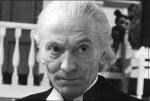 When talking about Doctor Who, we’re actually looking at two distinct cultural phenomena. The first began as a BBC series in 1963, and ended 26 years later in 1989. The second Who phenomena* is a J.J. Abrams era reboot (or in this case, regeneration) that began in 2005, and now grips both sides of the Atlantic. What does the new Who look like? Whenever a franchise gets recycled, its producers come a courtin’ with this solemn oath: we’re gonna take this thing in a whole new direction, AND be totally respectful of the series’ past. The results are sometimes ridiculous and unfortunate. (Like Disney’s The Lone Ranger.) But back in 2005, Doctor Who’s executive producer/head writer Russell T. Davies actually kept his promise. Armed with a creative team steeped in Whovian mythology, Davies kept many of the original show’s trademarks: the sonic screwdriver, the mechanical Daleks, the original soundtrack, and the beloved, squeaky TARDIS.
When talking about Doctor Who, we’re actually looking at two distinct cultural phenomena. The first began as a BBC series in 1963, and ended 26 years later in 1989. The second Who phenomena* is a J.J. Abrams era reboot (or in this case, regeneration) that began in 2005, and now grips both sides of the Atlantic. What does the new Who look like? Whenever a franchise gets recycled, its producers come a courtin’ with this solemn oath: we’re gonna take this thing in a whole new direction, AND be totally respectful of the series’ past. The results are sometimes ridiculous and unfortunate. (Like Disney’s The Lone Ranger.) But back in 2005, Doctor Who’s executive producer/head writer Russell T. Davies actually kept his promise. Armed with a creative team steeped in Whovian mythology, Davies kept many of the original show’s trademarks: the sonic screwdriver, the mechanical Daleks, the original soundtrack, and the beloved, squeaky TARDIS.
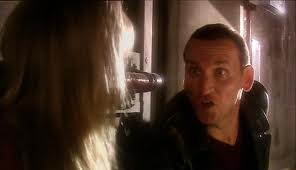 But the ninth incarnation of the series’ Doctor was something fans hadn’t exactly seen before. The froofy costumes and avuncular mad scientist affects were stripped away. In their place stood Christopher Eccleston, a well-known and respected film actor with a long, impressive resume. If anyone would take this show in a new direction, it would be its newly regenerated protagonist.
But the ninth incarnation of the series’ Doctor was something fans hadn’t exactly seen before. The froofy costumes and avuncular mad scientist affects were stripped away. In their place stood Christopher Eccleston, a well-known and respected film actor with a long, impressive resume. If anyone would take this show in a new direction, it would be its newly regenerated protagonist.
He was a sober figure. “… (Eccleston) has a very serious screen image,” said Davies. “There’s a lot of fun and humour in his portrayal, but of course when the Doctor is angry or passionate we get that other side of Christopher, which has helped make him one of Britain’s finest actors.”
In some ways, the 9th Doctor took the character in a direction that wasn’t new, but very, very old. Fans listening carefully could hear the faint patrician echo of Doctors One and Three. The 9th Doctor is a man of grim determination. His occasional flashes of humor barely mask the grimace of a formidable, sometimes heartless adversary. “Have pity!” cries his arch enemy, an imprisoned Dalek. “Why should I?” answers the Doctor, torturing his prisoner by process of electrocution, “You never did.” Eccleston’s is a Doctor of war, the last of his race, a scarred and lonely soldier whose square, singular focus on the present is understandable when we hear his apocalyptic vision of past and future:
You think it’ll last forever. People and cars and concrete. But it won’t. One day it’s all gone. Even the sky. My planet’s gone. It’s dead. It burned like the Earth. It’s just rocks and dust. Before its time.
The 9th Doctor, then, is a man of the time and culture that spawned him. In January of 2005 – the only year Eccleston played the Doctor – George W. Bush took the oath for his second term as President of the United States. Three months later, British Prime Minister Tony Blair got sworn in for term number three. There’s a long list of men and women responsible for the bloody, pointless war in Iraq, and Bush and Blair sit right on top. One month and two days later after Blair was sworn in, bombs ripped through London’s public transportation system, leaving 52 people dead, and many more injured. Blair blamed Islamic extremists for the act, and – sounding an awful lot like Doctor Number Nine – vowed: “We will not be intimidated.”
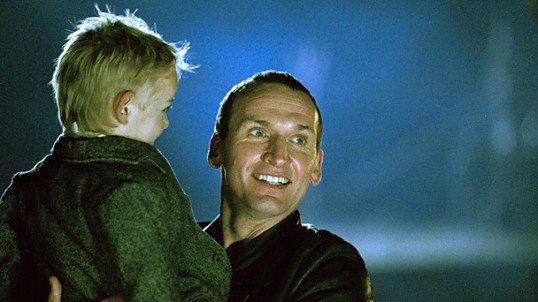
The 9th Doctor has many moments of warmth and compassion. But even then, his message is clear: things are as they must be. When his companion, Rose Tyler, manipulates the Doctor to take her back in time so she can prevent her father’s death, the Time Lord chastises her: “My entire planet died, my whole family. Do you think it never occurred to me to go back and save them?” His acts of heroism live in the shadow of tragedy’s looming inevitability. After saving a relatively small group of Londoners during the 1941 Blitz, he cries in a fit of messianic triumph: “Everybody lives, Rose! Just this once! Everybody lives!” It’s the 9th Doctor’s finest hour, yet he can’t help but remind us that it probably won’t happen again.
Public and critical reception for this darker Doctor were, for the most part, positive, and the series was renewed for another season. But Eccleston stepped down. For all he brought to the role, Doctor Who just wasn’t his gig. His successor was quickly announced: a thirty-four year old Scottish actor named David Tennant. Tennant had followed the show since childhood, and seemed remarkably eager for the challenge. But following Eccleston’s act appears to have been a daunting prospect. “…there’s an awful lot to live up to here. I know everyone loved Chris, and so did I, but hopefully I won’t disappoint people.”
 He needn’t have worried. A 2012 poll conducted by Entertainment Weekly would later show David Tennant to be the most popular Doctor of all time. But our past was his future, and even the show’s creative team found it necessary to prove Tennant man enough for the job. In fact, Tennant’s first appearance has him wondering aloud what “sort of man” he is. His final answer comes with an Eastwoodesque sneer, as he sends an enemy plunging to death: “No second chances. I’m that sort of a man.”
He needn’t have worried. A 2012 poll conducted by Entertainment Weekly would later show David Tennant to be the most popular Doctor of all time. But our past was his future, and even the show’s creative team found it necessary to prove Tennant man enough for the job. In fact, Tennant’s first appearance has him wondering aloud what “sort of man” he is. His final answer comes with an Eastwoodesque sneer, as he sends an enemy plunging to death: “No second chances. I’m that sort of a man.”
What makes the 10th the most popular Doctor ever? Internet theories are far-flung and ubiquitous, but I think that it boils down to this: fans are generous with Tennant because he’s so generous with them. If you want to see a man in love with his job, watch some 10th Doctor episodes, especially the earlier ones. Here was a Doctor who reached out to his allies, his adversaries, and his audiences. Even if this Doctor isn’t your favorite, Tennant’s sheer charisma and joie de vivre are pretty tough to resist.
But charm has its price, and the fee for Tennant’s was exacted on the surprisingly early occasion of his fifth appearance as the Doctor. In “School Reunion,” he joins forces with old companions Sarah Jane Smith and the robot dog, K-9. It is a fond and sentimental backward look at classic Doctor Who episodes, especially those from the vintage Tom Baker years. Warm and fuzzy would become a hallmark of Tennant’s Doctor. Try to imagine Chirstopher Eccleston picking Elisabeth Selden off the ground, beaming “My Sarah Jane!” as the music swells to a heart warming climax.
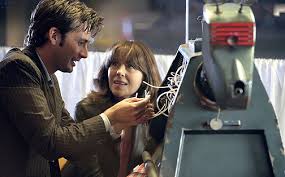 And that’s where the trouble begins. Not all of Eccleston’s episodes are great – or even good – but like their hero, most focus on a reasonably self-contained plot line. Not so with Tennant. The stories, the Doctor, and the actor who plays him become increasingly sentimental, self-absorbed, and above all: self-referential. Three seasons of the 10th Doctor feel less like a coherent story arc, and more like the uncovering of treasured family knick-knacks. “Hey look! The Cybermen! Why don’t we bring them back? The Sontarans? Aw, man! They were awesome! Why don’t we do one episode – or two, or three, or four – about them? That’d be cool!” Tennant’s tenure, then, is Doctor Who’s post-modern era, unceasingly asking the burning question of our age: remember when?
And that’s where the trouble begins. Not all of Eccleston’s episodes are great – or even good – but like their hero, most focus on a reasonably self-contained plot line. Not so with Tennant. The stories, the Doctor, and the actor who plays him become increasingly sentimental, self-absorbed, and above all: self-referential. Three seasons of the 10th Doctor feel less like a coherent story arc, and more like the uncovering of treasured family knick-knacks. “Hey look! The Cybermen! Why don’t we bring them back? The Sontarans? Aw, man! They were awesome! Why don’t we do one episode – or two, or three, or four – about them? That’d be cool!” Tennant’s tenure, then, is Doctor Who’s post-modern era, unceasingly asking the burning question of our age: remember when?
By the time Tennant was replaced by Matt Smith in 2010, Doctor Who’s course was set to forward into the past. New executive producer/head writer Stephen Moffat accelerated the pace: a 10th Doctor episode pays tribute to the memories of several seasons or episodes past; the 11th Doctor episodes get sentimental over events that took place a mere five minutes ago.
But when you’re watching an 11th Doctor episode, it’s kind of hard to figure out what exactly did happen five minutes ago. I realize that Steven Moffat’s taken quite a beating for his rambling, incoherent story arcs, but so far that just hasn’t stopped him. Jesus Christ, what the hell are we to make of some of these episodes? If the 10th Doctor’s all about the sentimental journey, then an 11th Doctor story such as “The Pandorica Opens” is a horribly botched magic trick, an Escher copy gone wrong, an awesome late night brainstorm that got filmed before anyone bothered to script it.
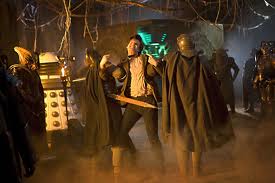 Call me old fashioned, but science fiction does not give you license to make up a bunch of random rules as you go along, and then break them whenever it’s convenient. That’s not science fiction, it’s bad fiction, and Steven Moffat ought to know better. This man is the author of “The Empty Child,” “The Doctor Dances,” and “Blink,” justly hailed as some of the best Doctor Who episodes ever made. “Blink” in particular is a textbook example of sci fi at its best. It begins by establishing a rigidly defined set of rules, then insisting that its characters play by all of them. The result is a taut, suspenseful tale in which the Doctor (not even the episode’s protagonist) has limited power to assist the people most in need of his help. It seems incredible that this script was penned by the same guy who gave us “The Big Bang,” “The Impossible Astronaut,” and the eminently unforgivable “Let’s Kill Hitler.” But perhaps that crack in the universe is a metaphor for Moffat’s bifurcated creative psyche.
Call me old fashioned, but science fiction does not give you license to make up a bunch of random rules as you go along, and then break them whenever it’s convenient. That’s not science fiction, it’s bad fiction, and Steven Moffat ought to know better. This man is the author of “The Empty Child,” “The Doctor Dances,” and “Blink,” justly hailed as some of the best Doctor Who episodes ever made. “Blink” in particular is a textbook example of sci fi at its best. It begins by establishing a rigidly defined set of rules, then insisting that its characters play by all of them. The result is a taut, suspenseful tale in which the Doctor (not even the episode’s protagonist) has limited power to assist the people most in need of his help. It seems incredible that this script was penned by the same guy who gave us “The Big Bang,” “The Impossible Astronaut,” and the eminently unforgivable “Let’s Kill Hitler.” But perhaps that crack in the universe is a metaphor for Moffat’s bifurcated creative psyche.
But there’s plenty of blame to go around. The hands of Russell T. Davies are also steeped in the blood of bad fiction. His overweening 10th Doctor space operas like “The Last of the Time Lords,” “The Stolen Earth,” “Journey’s End,” and “The End of Time,” sorely test the patience of any reasonable viewer in search of a story that makes one ounce of logical sense.
Davies and Moffat are smart, imaginative men. Why have they written so many bad scripts? The answer lies in the much hyped, much watched 50th anniversary special. Like most Doctor Who episodes, “Day of the Doctor” is a mixed bag. Fans of David Tennant and the quirky, unpredictable Matt Smith can’t help but smile at the sight of these two eager hams finally sharing the screen. It’s a wonderful reminder of what these men bring to the show that Eccleston never could: pure love for the role and the series. Let’s be thankful that Eccleston passed on the chance to appear on the special: he would have been an awful drag and a dour old chaperone. Science fiction does not have the right to be bad, but it does have the right to fun, and even – occasionally – silly.
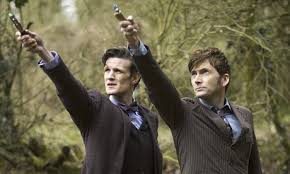 And David Tennant? Matt Smith? Those guys are silly. Really silly. “Why are you pointing your screwdrivers like that?” cries John Hurt’s so called ‘War Doctor.’ “They’re scientific instruments, not water pistols!” And indeed, Doctors 10 and 11 are just a couple of boys, aren’t they? A pair of lads having fun, intergalactic Peter Pans who whisk their doe-eyed Wendy companions from one Never-Never Land to the next, clinging to the TARDIS as a fountain of youth in the hope that they’ll never grow up.
And David Tennant? Matt Smith? Those guys are silly. Really silly. “Why are you pointing your screwdrivers like that?” cries John Hurt’s so called ‘War Doctor.’ “They’re scientific instruments, not water pistols!” And indeed, Doctors 10 and 11 are just a couple of boys, aren’t they? A pair of lads having fun, intergalactic Peter Pans who whisk their doe-eyed Wendy companions from one Never-Never Land to the next, clinging to the TARDIS as a fountain of youth in the hope that they’ll never grow up.
Is that a bad thing? I don’t know. Probably not. The youthful impishness is what draws us to the 10th and 11th Doctors. But perhaps we should be troubled. Nostalgia – such a mainstay of current pop culture – is rooted in the fear of growing older. The same is true of Doctor Who’s incomprehensible storylines. It’s not just that they’re terrible, it’s the way in which they’re terrible. Here’s the basic formula:
- Some awful catastrophe threatens to bring about the end of an important character/the planet/the human race/the entire universe.
- The catastrophe almost occurs. In many cases, it does occur. Either way, all is lost.
- A miracle saves the day, preventing, or even – and this is what happens with far greater frequency in later episodes – reversing the catastrophe. No rational explanation; it just simply happens. No major character dies (unless it is the end of the season and time to replace an actor).
So it is for “Day of The Doctor.” Fans are finally brought to scene of the Time War, the battle that destroyed the Doctor’s home planet, Gallifrey. It is the site of the genocide that deeply haunted the Doctor Number Nine. And so, when we’re finally brought there, to the tragic moment of irrevocable loss, we discover…
…that it never happened. The war? The genocide? Oops! My bad. We just thought that it did. According to Wikipedia, the episode’s three Doctors: “freeze the planet in time within a secondary/pocket universe.” Then, through another act of intergalactic magic, the doctors explain that they’re going to forget that they’ve ever done this (so that all the previous episodes still make sense). You got that? They’ll remember the genocide, but we’ll all know that it never really happened.
Now again, I hate to sound old fashioned, but why choose to tell a story about genocide if you aren’t prepared to deal with it? It’s one thing to miraculously bring one or two characters back to life through a little bit of sci-fi magic. But genocide? Really? Whatever, man. I guess it’s just a TV show. Just goes to show that we’ve come a long way since 2005. With far fewer troops in Iraq** and Afghanistan, the trans-Atlantic mainstream is no longer pre-occupied with global politics, or – more importantly – the First World’s responsibility for how they play out. The Gallifrean genocide myth was created at a time when it was impossible for anyone to ignore the realities of war. Now, if you have the luxury of being able to indulge a binge on Netflix, it is entirely possible to ignore those realities. But the folks at Doctor Who have been stuck with a genocide narrative that audiences now don’t want to hear. Better to just pretend that it never even happened. This is where nostalgia and deux ex machina endings work together: they encourage us to selectively remember the past, and anesthetize us to the horrors of the present.
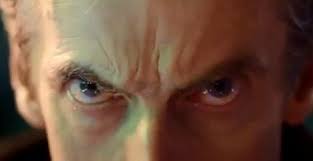
But as of Christmas, 2013, there’s going to be a new Doctor in town. It’s impossible to predict with any certainty what kind of change the 12th Doctor will bring, but one thing’s for sure: Peter Capaldi’s no Peter Pan. Moffat has insisted that the fifty-five year old character actor is the only man he considered for the part of the 12th Doctor. Indeed, Moffat seems ready to take the show in a completely different direction, promising fans that “now it’s time for the old beast to snarl.”
Really? Wow! Who’s he going to snarl at? And why? I guess we’ll know soon enough. And like most Doctor Who fans, I’m willing to sit through just about anything. But if I have any hope for the 12th Time Lord, it’s this: that somewhere in his voice we hear a little bit of the old snarl from 2005. Escapism is great, but this series, in its best moments, has shown us that we can do better. Maybe Doctor Who is finally ready to liberate itself from this fixed point in time, and start telling us truths we might not want to hear.
David Berkson
December 18, 2013
Don’t forget to “like” The Autumning Empire on Facebook. You can contact David Berkson at davidberkson66@gmail.com, or @DavidBerkson on Twitter.
* The two series were bridged by a 1996 TV film starring Paul McGann as the 8th Doctor.
** There are currently no British troops in Iraq.

 An open letter to my congressman. I urge him to draw up articles of impeachment against President Donald J. Trump. I will not vote for my congressman in November if he doesn’t. Please consider writing a similar letter to your representative. If they don’t do their job, they don’t deserve your vote. You can find your representative’s contact information
An open letter to my congressman. I urge him to draw up articles of impeachment against President Donald J. Trump. I will not vote for my congressman in November if he doesn’t. Please consider writing a similar letter to your representative. If they don’t do their job, they don’t deserve your vote. You can find your representative’s contact information 



